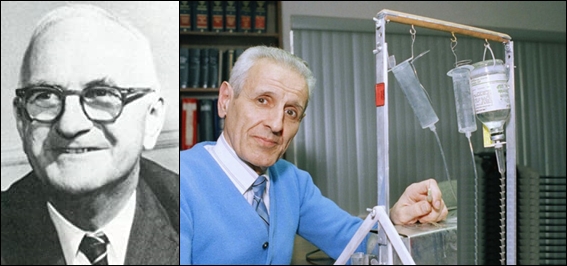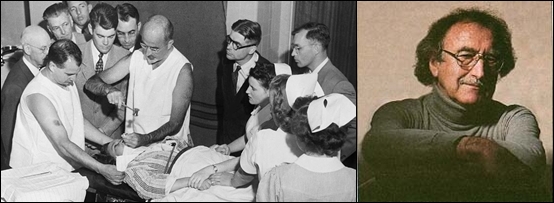Informator uniwersytecki
numer 012
marzec 2022
★
12
Four Musketeers or The Lords of the Sith?
The top scientists or the monsters? The ‘four musketeers’ or the ‘Lords of the Sith’ - interpretation is on your side. Numerous discoveries were either done in a controversial way or the research was flawed. Individuals were not informed of the far-reaching consequences, the study was ‘inhumane’, and there was a lot of psychologiocal and physical suffering of those involved. Most of us are familiar with Stanley Milgram’s “Obedience to authority” test and Philip Zimbardo’s ‘Stanford prison experiment’ (SPE), the findings of which were devastating. The ones down here are also on the list. Paradoxically some questions posed in their research reappear today and are discussed with the vivid original passion.

1. Dr Ewan Cameron - the psychiatrist - the President of the American Psychiatric Association (1952–1953) Criticized for administering electroshock therapy and experimental drugs to patients without their informed consent. These practices took place in the context of MKULTRA project 68 - a mind control program, which was covertly sponsored by the Central Intelligence Agency (CIA) Cameron had been hoping to correct schizophrenia by erasing existing memories and reprogramming the psyche. His "driving" experiments consisted of rendering a subject into a drug-induced coma for weeks while playing tape loops of noise or simple statements. These experiments were typically carried out on patients who had entered the institute for minor problems such as anxiety disorders and postnatal depression; many suffered permanent debilitation after these treatments. Dr Cameron also treated homosexuality using shock and extreme psychotherapy. Homosexuality was classified as a sexual deviation both in the first edition of the Diagnostic and Statistical Handbook of Mental Disorders (DSM-I) in 1952 and existed as such till 1979.


4. Dr John Money - psychologist, sexologist specializing in research into sexual identity and biology of gender. He was one of the first scientists to study the psychology of sexual fluidity and how the societal constructs of "gender" affect an individual. More recent academic studies have criticized Money's work in many respects, particularly in regards to his involvement with the sex-reassignment of David Reimer and his eventual suicide. During his professional life, Money was respected as an expert on sexual behavior, especially known for his views that gender was learned rather than innate. (nurture vs. nature) Many years later, however, it was revealed that his most famous case was fundamentally flawed.
Piotr Flieger
Department of Foreign Languages
Did you liked it?
Check Piotr's previous articles:
© 2022 Centrum Symulacji Medycznej UM w Lublinie






